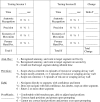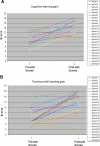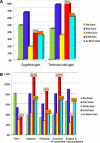Measuring learning gain during a one-day introductory bronchoscopy course
- PMID: 20585964
- PMCID: PMC3003781
- DOI: 10.1007/s00464-010-1161-4
Measuring learning gain during a one-day introductory bronchoscopy course
Abstract
Background: Rigorous assessment of medical knowledge and technical skill inspires learning, reinforces confidence, and reassures the public. Identifying curricular effectiveness using objective measures of learning is therefore crucial for competency-oriented program development in a learner-centric educational environment. The aim of this study was to determine whether various measures of learning, including class-average normalized gain, can be used to assess the effectiveness of a one-day introductory bronchoscopy course curriculum.
Methods: We conducted a quasi-experimental one-group pre-test/post-test study at the University of California, Irvine. The group comprised 24 first-year pulmonary and critical care trainees from eight training institutions in southern California. Class-average normalized gain, single-student normalized gain, absolute gain, and relative gain were used as objective measures of cognitive knowledge and bronchoscopy technical skill learning. A class-average normalized gain of 30% was used to determine curricular effectiveness. Perceived educational value using Likert-scale surveys and post-course questionnaires was determined during and 3 months after course participation.
Results: Mean test scores of cognitive knowledge improved significantly from 48 to 66% (p = 0.043). Absolute gain for the class was 18%, relative gain was 37%, class average normalized gain <g> was 34%, and the average of the single-student normalized gains g(ave) was 29%. Mean test scores of technical skill improved significantly from 43 to 77% (p = 0.017). Absolute gain was 34%, relative gain was 78%, class average normalized gain <g> was 60%, and the average of the single-student normalized gains g(ave) was 59%. Statistically significant improvements in absolute gain were noted in all five elements of technical skill (p < 0.05). Likert-scale surveys, questionnaires, and surveys demonstrated strong perceived educational value.
Conclusion: The effectiveness of a one-day introductory bronchoscopy curriculum was demonstrated using a pre-test/post-test model with calculation of normalized gain and related metrics.
Figures



Similar articles
-
Development of Learning Curves for Bronchoscopy: Results of a Multicenter Study of Pulmonary Trainees.Chest. 2020 Dec;158(6):2485-2492. doi: 10.1016/j.chest.2020.06.046. Epub 2020 Jul 3. Chest. 2020. PMID: 32622822
-
Virtual reality and written assessments are of potential value to determine knowledge and skill in flexible bronchoscopy.Respiration. 2004 May-Jun;71(3):269-75. doi: 10.1159/000077425. Respiration. 2004. PMID: 15133347
-
Development and Validation of a Bronchoscopy Competence Assessment Tool in a Clinical Setting.Ann Am Thorac Soc. 2016 Apr;13(4):495-501. doi: 10.1513/AnnalsATS.201508-548OC. Ann Am Thorac Soc. 2016. PMID: 26862890
-
Training in interventional pulmonology: What we have learned and a way forward.Respirology. 2020 Sep;25(9):997-1007. doi: 10.1111/resp.13846. Epub 2020 May 26. Respirology. 2020. PMID: 32453479 Review.
-
Competence and training in interventional pulmonology.Panminerva Med. 2019 Sep;61(3):203-231. doi: 10.23736/S0031-0808.18.03562-0. Epub 2018 Oct 31. Panminerva Med. 2019. PMID: 30394710 Review.
Cited by
-
A Longitudinal Study of Multimodal Bronchoscopy Training in Uganda.ATS Sch. 2023 Feb 8;4(2):152-163. doi: 10.34197/ats-scholar.2022-0080OC. eCollection 2023 Jun. ATS Sch. 2023. PMID: 37538081 Free PMC article.
-
Learning gain of pharmacy students after introducing guided inquiry learning with computer simulation in a pharmacology class in Fiji.J Educ Eval Health Prof. 2013 Oct 23;10:9. doi: 10.3352/jeehp.2013.10.9. eCollection 2013. J Educ Eval Health Prof. 2013. PMID: 24498470 Free PMC article.
-
Improved emotional intelligence in perioperative care through simulation-based medical education during anesthesiology residency training: a call for implementation.Adv Med Educ Pract. 2019 Jan 29;10:39-42. doi: 10.2147/AMEP.S164752. eCollection 2019. Adv Med Educ Pract. 2019. PMID: 30774498 Free PMC article.
-
Can We "Up Our Game" in Bronchoscopy Procedural Training?ATS Sch. 2020 Jun 16;1(2):79-81. doi: 10.34197/ats-scholar.2020-0031ED. ATS Sch. 2020. PMID: 33871483 Free PMC article. No abstract available.
-
High-fidelity simulation self-training enables novice bronchoscopists to acquire basic bronchoscopy skills comparable to their moderately and highly experienced counterparts.BMC Med Educ. 2018 Aug 7;18(1):191. doi: 10.1186/s12909-018-1304-1. BMC Med Educ. 2018. PMID: 30086734 Free PMC article.
References
-
- Wahidi MM, Silvestri GA, Coakley RD, Ferguson JS, Shepherd RW, Moses L, Conforti J, Que L, Anstrom KJ, McGuire F, Colt H, Downie GH. A prospective multi-center study of competency metrics and educational interventions in the learning of bronchoscopy among starting pulmonary fellows. Chest. 2009;137(5):1040–1049. doi: 10.1378/chest.09-1234. - DOI - PubMed

